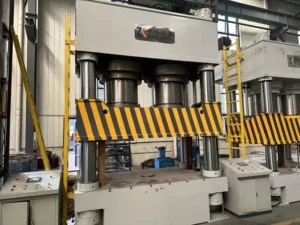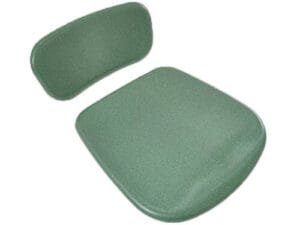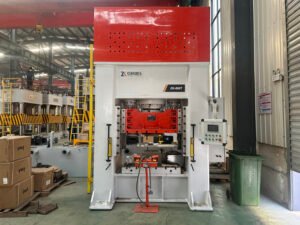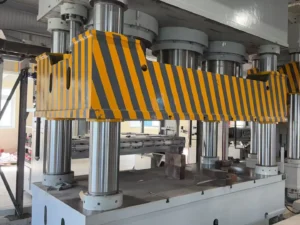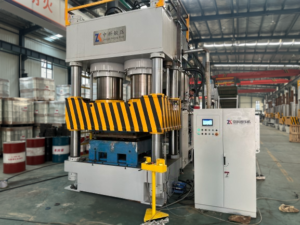As businesses strive to reduce their environmental impact, one key area often overlooked is the choice of shipping pallets. Presswood pallets or molded pallets are emerging as an alternative to traditional wooden and plastic pallets.

The presswood pallet is also called molded pallets or pressed pallets. In this article, we’ll discuss how Presswood pallets or molded wood pallets help businesses promote sustainability through waste reduction, lower emissions, and eco-friendly design.
The following are the advantages of molded pallets:
1. Presswood pallet Manufactured from Recycled Wood Materials
Presswood pallets are crafted from recycled wood fibers, including timber industry by-products like wood chips, sawdust, and shavings. These materials are compressed under high heat and pressure, forming a durable and lightweight pallet without requiring new trees to be cut down.
Waste Reduction: Compressed wood pallets use wood by-products to help repurpose what would otherwise become waste, reducing reliance on virgin timber resources.
Sustainability Advantage: Using recycled wood promotes a circular economy and keeps waste out of landfills, making compressed wood pallets an environmentally friendly choice.
2. Presswood pallet Biodegradable and Easy to Recycle
Unlike plastic pallets that persist for centuries, Presswood pallets are biodegradable. At the end of their life, they decompose naturally, reducing environmental impact.
Biodegradability: Compressed wood pallets naturally break down when no longer needed, without leaving behind harmful residues—unlike plastic, which contributes to long-lasting pollution.
Recyclability: These pallets can also be ground down and reused to create new pallets or other wood-based products, extending the life of the materials and preventing additional waste.
Eco-Benefit: Compressed wood pallets offer a sustainable end-of-life solution, either decomposing or being recycled, compared to non-biodegradable options like plastic.
3. Energy-Efficient Production Process
The production of Presswood pallets is more energy-efficient compared to traditional wooden or plastic pallets.
Lower Energy Use: Compressed wood pallets are made using a high-pressure molding process that requires less energy than plastic pallet manufacturing, which relies on petroleum and complex processes. Additionally, using recycled wood reduces the need for logging, further cutting down carbon emissions associated with harvesting and transporting raw wood.
Sustainability Benefit: By consuming less energy in production and minimizing the need for new materials, compressed wood pallets help lower greenhouse gas emissions, supporting businesses in reducing their carbon footprint.
4. Lightweight Design Reduces Transportation Emissions
Presswood pallets are known for their lightweight structure, which translates to lower fuel consumption during transport—a major contributor to a company’s carbon footprint.
Lighter Weight: These pallets are lighter than traditional wooden pallets, allowing for substantial fuel savings when shipping products. Reduced weight means fewer emissions from trucks, planes, and ships.
Nestable Design: Compressed wood pallets can nest together when empty, saving space during return shipments or storage and resulting in fewer trips and reduced fuel usage.
Green Impact: Lightweight and space-efficient, compressed wood pallets lower transportation emissions, making logistics operations more environmentally friendly.
5. Durable and Long-Lasting
Despite being lightweight, Presswood pallets are durable and resilient. Their molded, one-piece design makes them resistant to breakage and splintering, extending their lifespan compared to other low-cost pallet options.
Durability: The high-pressure molding process creates a solid structure that doesn’t easily crack or warp, making these pallets suitable for multiple uses.
Reusability: Longer-lasting pallets reduce the need for frequent replacements, which in turn cuts down on waste and conserves resources.
Environmental Advantage: Extended pallet lifespan leads to less waste and a smaller environmental footprint from production and disposal.
6. Aligns with Global Environmental Standards
As environmental sustainability becomes a priority, many companies aim to comply with global standards. Compressed wood pallets help businesses meet these goals by adhering to international regulations.
Regulatory Compliance: These pallets meet ISPM 15 phytosanitary standards, making them suitable for international shipping without the need for additional heat treatment or fumigation. This saves energy and resources, aligning with global trade regulations in an eco-friendly way.
Sustainable Solution: By choosing compliant pallets, businesses can reduce their carbon footprint and meet global environmental standards, supporting broader sustainability goals.
7. Presswood pallet is A Viable Alternative to Plastic Pallets
While plastic pallets are widely used for durability, Presswood pallets offer a green alternative without the negative environmental impact of plastic.
Reducing Plastic Waste: Unlike plastic pallets, which can contribute to pollution if not recycled, compressed wood pallets are both biodegradable and recyclable, avoiding plastic’s long-lasting waste issues.
Lower Carbon Impact: Plastic pallet production relies on petroleum-based materials, which increase carbon emissions. Compressed wood pallets, made from recycled materials, support a low-carbon economy.
Eco-Benefit: For companies seeking a sustainable and durable pallet option, compressed wood pallets provide an effective alternative, helping reduce plastic waste and overall environmental impact.
Conclusion: Compressed Wood Pallets as the Eco-Friendly Choice
Switching to Presswood pallets allows businesses to make meaningful steps toward greener operations. These pallets offer numerous environmental benefits, from reducing waste and emissions to promoting sustainable logistics.
Why Presswood Pallets are a Sustainable Choice:
- Crafted from recycled materials, lowering waste.
- Biodegradable and recyclable, minimizing landfill impact.
- Energy-efficient production with lower carbon emissions.
- Lightweight design reduces fuel usage and emissions during transport.
- Durable and reusable, lowering waste and conserving resources.
- Meets global environmental standards, supporting sustainable practices.
By opting for compressed wood pallets, businesses can make an eco-conscious choice that supports both their logistics needs and sustainability initiatives.

